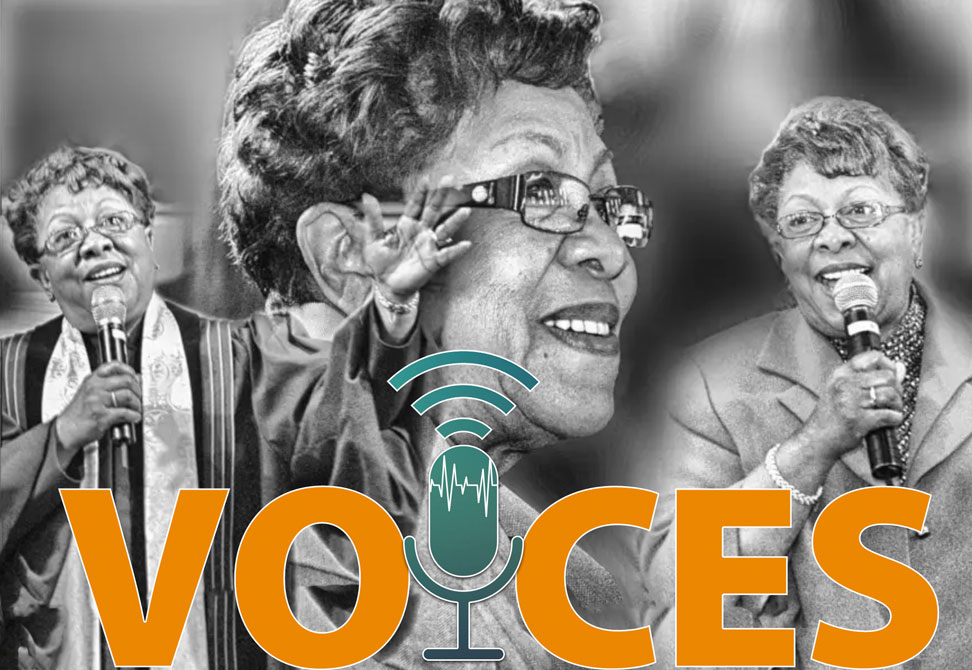The content of this VOICES is courtesy of the Alexandria African American Hall of Fame. “A Speech for Prosperity,” given on October 23, 2018 at the Carlyle Club, in Alexandria, VA. To see the speech in its entirety please visit alexandriaafricanamericanhalloffame.org
Dr. Faye S. Gunn is the granddaughter of a Chincoteague Island sharecropper who was encouraged to build a better life for herself. She traveled 100 miles each day to earn her high school diploma even though her small island had three elementary schools and two high schools. Those schools were for whites only. She went on to earn her degree from Norfolk State University, became a teacher at ACPS, and was the first black minister of Alfred Street Baptist Church.
Listen to Dr. Gunn share the challenges she faced growing up as a black woman.
 Bringing You the Voices That are the Heart and Soul of ACPS
Bringing You the Voices That are the Heart and Soul of ACPS
VOICES is an audio series that shares the stories of our students, families and staff — in their words and in their voices. Everyone’s story is different. Success looks different for every person. VOICES celebrates these differences and successes by sharing the stories that are the heart and soul of ACPS. Listen to other stories in this series and subscribe to the VOICES podcast.
TRANSCRIPT
Dr. Gunn:
… these words, wrongs of discrimination are never corrected. I can say unequivocally, all of my suffering and struggling was not in the real sense that a brutality as we see each and every day, but rather what was done to me, and many other black women was, and is simply racial injustice, and oppression, and it was not because we did not have the proper credentials, and it did not always have to do with what side of the track you lived and came from, but rather we were discriminated against because of the color of our skin. We’ve come a mighty long way, but we still have a long way to go. How far have we really come since the integration of schools here in the city of Alexandria, Virginia? With all that has been said and done, we still have not come far enough.
I grew up under the watchful eyes of loving grandparents on an Island called Chincoteague, Virginia and my grandfather was a sharecropper for chickens, but at the end of the season which usually was 10 weeks, much of the profits went to the white man, and my grandmother was a domestic worker. My grandfather wanted more for me than he ever had the opportunity to pursue. He did not earn an elementary or high school diploma, but he had lots of common sense. He encouraged me to get the best education possible, and to always do my very best, and that I have tried to do, and for this generation, African American women must continue to encourage.
We must be mentors and role models for all children, but back in the ’60s I was not privileged as a black child to attend any of the schools on the Island, although, there were three elementary schools and two high schools. I had to get up before dawn and come home oftentimes after dark. We had to cross seven bridges for me to attend what was then the Watsonville Elementary School. Six years later to attend Mary N. Smith High School. I had to travel approximately a hundred miles a day, round trip to earn a high school diploma, but I graduated in the top 10% of my class. I made my way to Norfolk State University, earned a bachelor’s degree in business education, and married my college sweetheart, who’s here tonight, Fred J. Gunn.
In 1969, we moved to Alexandra, Virginia from Danville, Virginia, but in Danville I was the second African American teacher who volunteered, and taught ironically at the George Washington High School there, but those white students taunted me under their breath until I sent them to the office, never to return until they apologized in front of the class, and they did, and then, here in Alexandra, my husband was hired first. I substituted, and then, I was hired to teach business at George Washington Middle School, and after two years at George Washington, I applied for a position at T.C. Williams High School and received that position.
The schools were just becoming integrated, but as a cooperative office education coordinator, I taught typing I, business law and office services, which was a class for the disadvantaged students, the students that were economically deprived, but the black teachers were scheduled to teach the office services, one and two students, not the white teachers, and these students were not encouraged or even they expected to succeed as the other students, students in the business curriculum. It was said to me, “Fay, you will never be able to place them on any jobs, because they won’t go to work. They don’t know how to act or dress or what to say.” But, I made them out a liar.
I took my job seriously, and those students that look just like me, and I instilled in them that they had better act like me on the job and in the classroom. I earned their respect, because I respected them, and loved them as human beings, but interesting enough, those students who had been identified as disadvantaged, were the same students that I placed on jobs in the district of Columbia, in Crystal City, and wherever I could find jobs for them, and to this day, some come to Alfred Street, give me a hug. I see them at the Giant. One used to work at The Giant downtown, one still works at BJ’s at Landmark, and these students were so labeled, not because of their inability to do the academics, not because of their behavior, but because of the color of their skin where they lived, and the privileges they did not have right here in the city of Alexandria.
But, after two to three years in the classroom, I decided to apply for the opening of an assistant principalship at T.C. Williams High School. I had demonstrated, so I thought that I was ready for administrative leadership. I received all excellent evaluations that were a testament that I could do the job. I had earned my master’s degree in secondary administration and education, not cum laude, not magna cum laude, but summa cum laude, and I just knew without a shadow of a doubt that I was on my way to becoming the first black woman, to be an assistant principal at the T.C. Williams High School in Alexandria, Virginia.
I was interviewed by the principal, Tony Hanley, for that assistant principalship, and it was about a week or so later that Mr. Hanley called me into his office, and he said, “I want to share some good news with you.” I can’t imagine the expression that must’ve been on my face that day, but he said, “I want to offer you the position to become the assistant principal.” I thanked him so very much, but he said to me as I was about to leave, and this was a Friday afternoon, he said, “Mrs. Gunn, you can give me your answer on Monday.” I said, “Mr. Hanley, I don’t need to give you my answer on Monday. I can give you my answer right now. I accept that position.” But, sadly to say about four or five hours later that afternoon, I received a call at home from Mr. Hanley apologizing for the decision he had made to offer me that position.
He said, “Mrs. Gunn, I’m very sorry, but the central office has rescinded that position, and it has been given to a white woman.” You can imagine how I felt at that moment. My bubble had been burst. My confidence put to shame, and my intellect challenged. What I’ve come to realize after many years of the past that it was all right for black women to be teachers in the classroom, but they could not hold a position in the main office. That decision did not have anything to do with my intellectual abilities, or credentials. It had to do with the color of my skin. Alexandria was not ready for a black woman to have an office, and to make administrative decisions for the school, and all students, black and white.
I cried again, but this time these were tears of sadness, hurt, and feeling less than, yet, here I was a black woman, prepared as far as I knew in my own mind, excellent evaluations, a master’s degree in administration, summa cum laude, a principal who wanted me, but the central office who did not see it his way, but to appease me and to possibly stop a lawsuit, and the NAACP from becoming involved, I was offered a position at Hammond Middle School. Well, listen to what they did. They changed the title from assistant principal to intern assistant, but I did not give up. I gave it my very best. We know it would not be wise to want to relive the past, but surely we can learn from the past.

